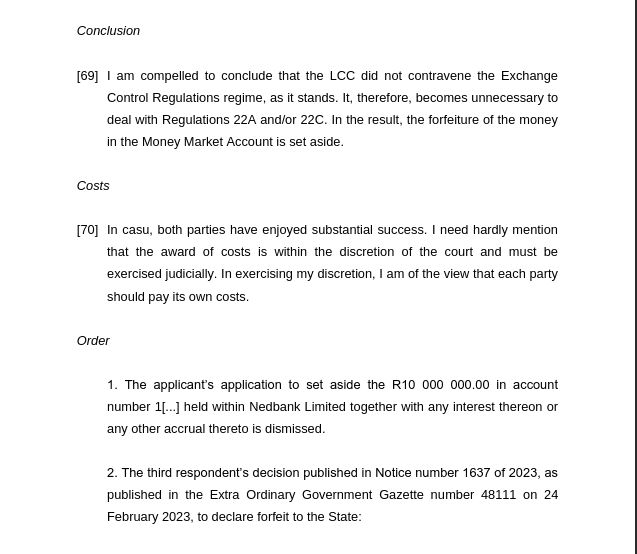In a groundbreaking decision with global ramifications, South Africa’s High Court ruled that cryptocurrencies fall outside the scope of the nation’s exchange control regulations.
The exchange control case, a heated debate between Standard Bank v. South African Reserve Bank, has sent shockwaves through financial and regulatory circles, with the Pretoria High Court clarifying that cryptocurrencies are not classified as “money” or ”capital” under existing South African crypto laws.
This judgment has far-reaching implications requiring much-needed speculation and updates on its virtual assets legislation.
In Brief
- SARB’s case exposes gaps in South African crypto laws, demanding urgent legislative reforms to address virtual assets.
- Cryptocurrencies’ exclusion from capital controls risks capital flight, challenging regulators to balance innovation and financial stability.
- FATF’s travel rule and cross-border crypto enforcement will shape Africa’s regulatory future, requiring agile compliance strategies.
South African Crypto Laws Tested in Historic Ruling
At the centre of the exchange control case was a heated dispute between SARBS and Standard Bank regarding Bitcoin transfers.
The case involved the bank’s clientele, Leo Cash and Carry, a now-liquidated company, which transferred $37 million (R556 million) worth of Bitcoin via local exchanges and transferred it offshore in 2019.
SARB hastily acted before the funding could cross its jurisdiction, citing that the transaction violated exchange control laws.
SARB’s Financial Surveillance Unit(FinSurv) froze LCC’s accounts and attempted to forfeit $1 million held by Standard Bank as a response to the violation of SA crypto laws.
However, Judge Mlambo rejected SARB’s argument, citing that cryptocurrencies do not fall under the definitions of currency or capital as outlined in the Exchange Control Act.
The court stated:
“Cryptocurrency is not money.”
This statement comes after referencing SARB’s documentation which categorized digital asses as “codes on a digital ledger” with a global nature.
SA Crypto Laws and the Exchange Control Case
The case has highlighted an urgent need for the South African crypto laws to evolve. Despite being hailed as one of the continent’s pro-crypto regions, the regulatory frameworks still lack in several areas.
While the court didn’t rewrite the law, legislative amendments are necessary to address gaps within the current framework.
For instance, the 2011 Oilwell v Protec International case, which ruled that intellectual property was not “capital,” led to subsequent amendments.
Experts warn that the gap could trigger capital flight, echoing IMF concerns about digital assets circumventing controls in emerging markets.
CHECK OUT: Comply or Cry: Binance’s New Rules Shake Up South African Crypto
This could have catastrophic consequences, more so with Africa steadily shifting to stablecoins and crypto as an alternative to fiat currency, potentially destabilizing an economy.
As Baker McKenzie noted,
This reprieve may be short-lived, as future legislative amendments could reassert regulatory oversight.”
The ruling also raises questions about the role of virtual assets legislation in balancing innovation with financial stability.
SARB Crypto Case Implications for Global Markets
Beyond South Africa, the case offers lessons for central banks worldwide.
Within Africa, many regions are reassessing how digital asset laws intersects with monetary policies.

Final verdict from the court.[Photo: High-Court-South-Africa]
The case also exposes jurisdiction challenges, with Judge Mlambo stating that cryptocurrencies’ borderless nature defies traditional regulatory tools.
This reality complicates enforcement, necessitating better regulation that accounts for its vast reach.
FATF’s 2023 guidance urging “travel rule” adoption for crypto transactions—a measure South Africa plans to implement by 2025—reflects this shift.
The Path Forward: Legislative Reforms and Market Adaptation
Given the outcome of the case, policymakers must act swiftly to update its crypto laws addressing the loop before investors and traders flood the market.
Legislative amendments for crypto are expected, given the rapid developments of Africa’s crypto market.
Key considerations include:
- Defining virtual asset laws to encompass cryptocurrencies explicitly.
- Balancing innovation with safeguards against capital flight.
- Collaborating with international bodies to harmonize regulations.
While the absence of exchange controls may attract crypto investment strategies, the risk of future regulatory shifts remains. Investors and traders must account for both short-term opportunities and longer-term challenges.
As Norton Rose Fulbright’s Desiree Reddy and Ntokozo Ngubane stated,
“The decision underscores the pressing need for legislative reform to provide clarity and certainty.”
A Watershed Exchange Control Case
The exchange control case pokes a hole in South Africa’s famed crypto laws. Exempting digital assets from capital control provides a challenge for regulators to modernize existing frameworks while highlighting the global struggle and institutional adoption.
CHECK OUT: Crypto Wallet Adoption Accelerates: Key Trends and Innovations Shaping 2025 and Beyond
Fostering a balanced regulatory environment is often an ideal concept, but balancing the need for consumer protection while safeguarding economic stability is a feat in and of itself.
Global regulatory environments have yet to achieve this, but with gradual reforms and public participation, South Africa might pioneer adaptive crypt laws.
As legislative amendments loom, businesses and investors must stay agile—leveraging crypto investment strategies that prioritize compliance and adaptability.
The SARB crypto case implications extend far beyond borders, offering a blueprint for democracies navigating the crypto-driven future of finance.

